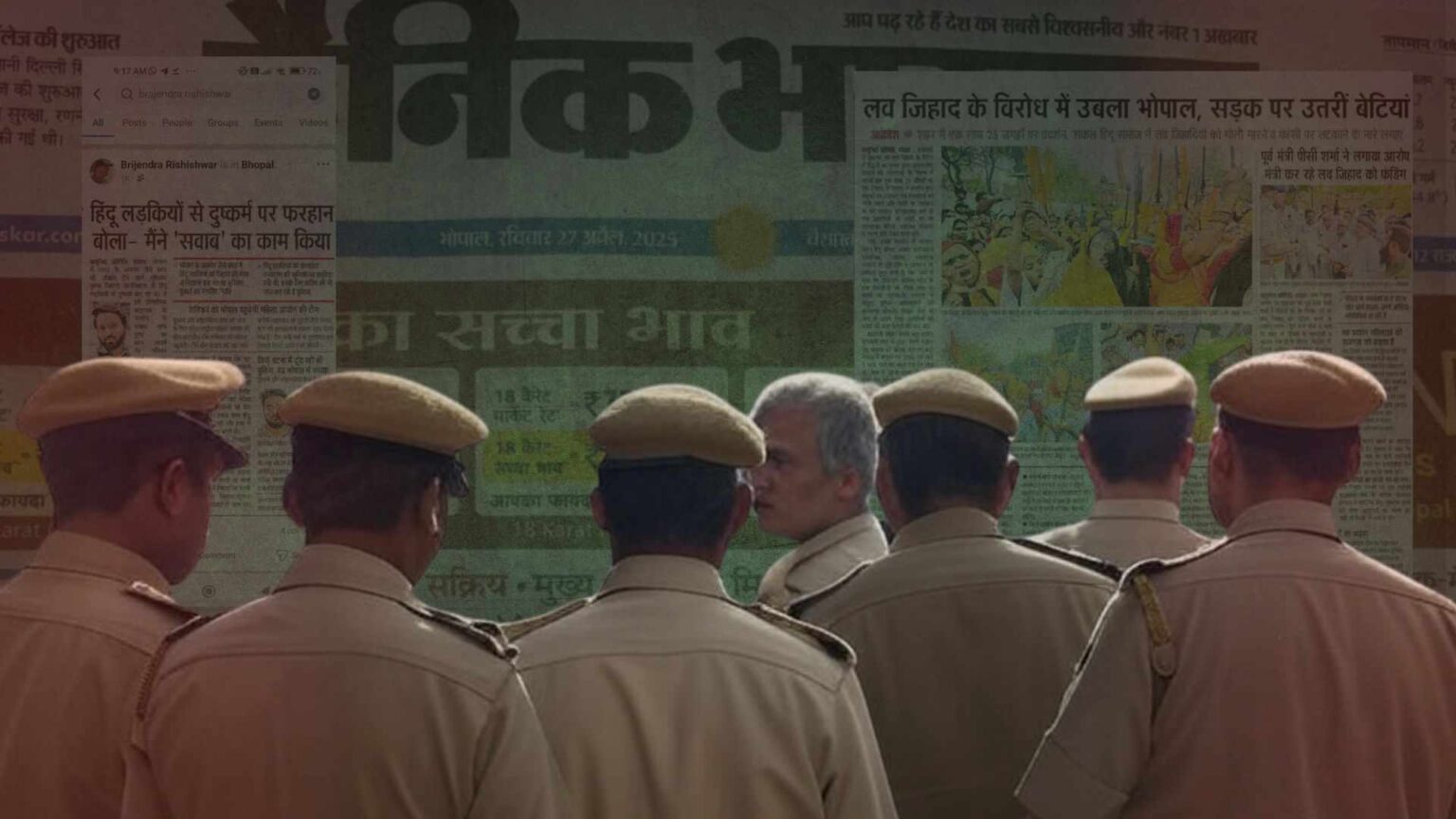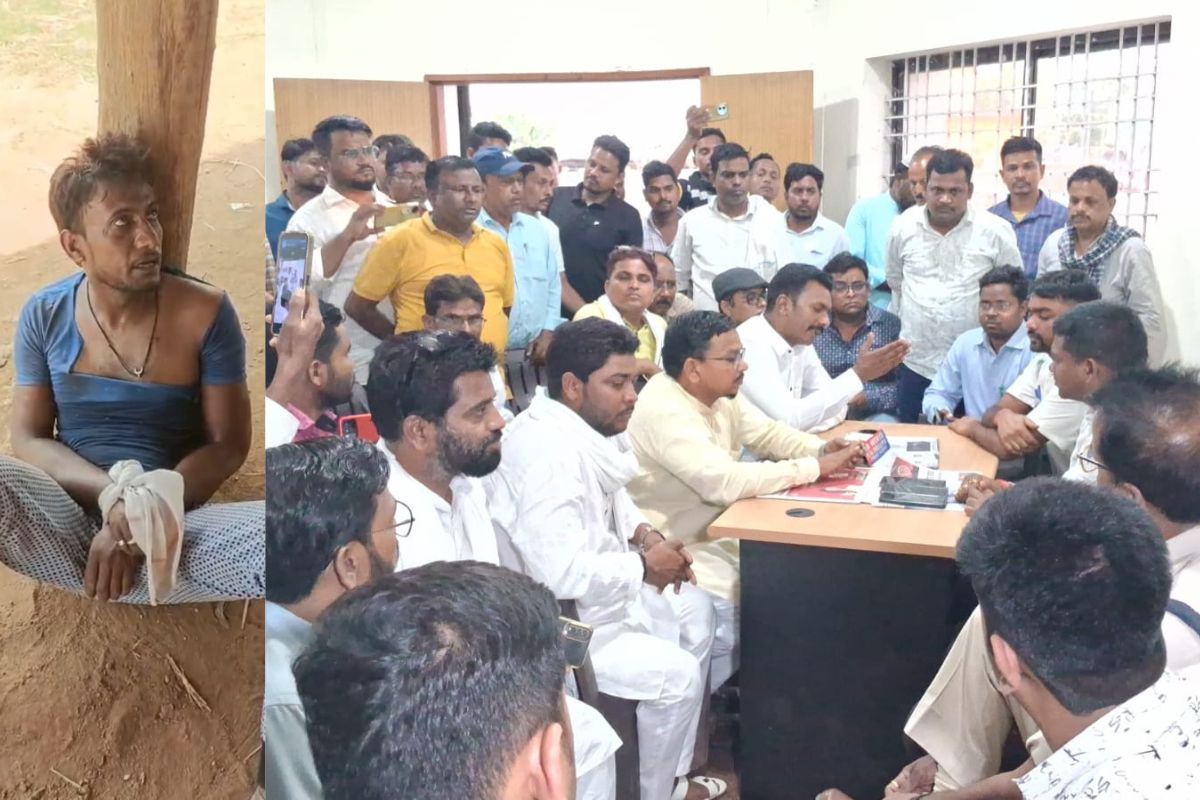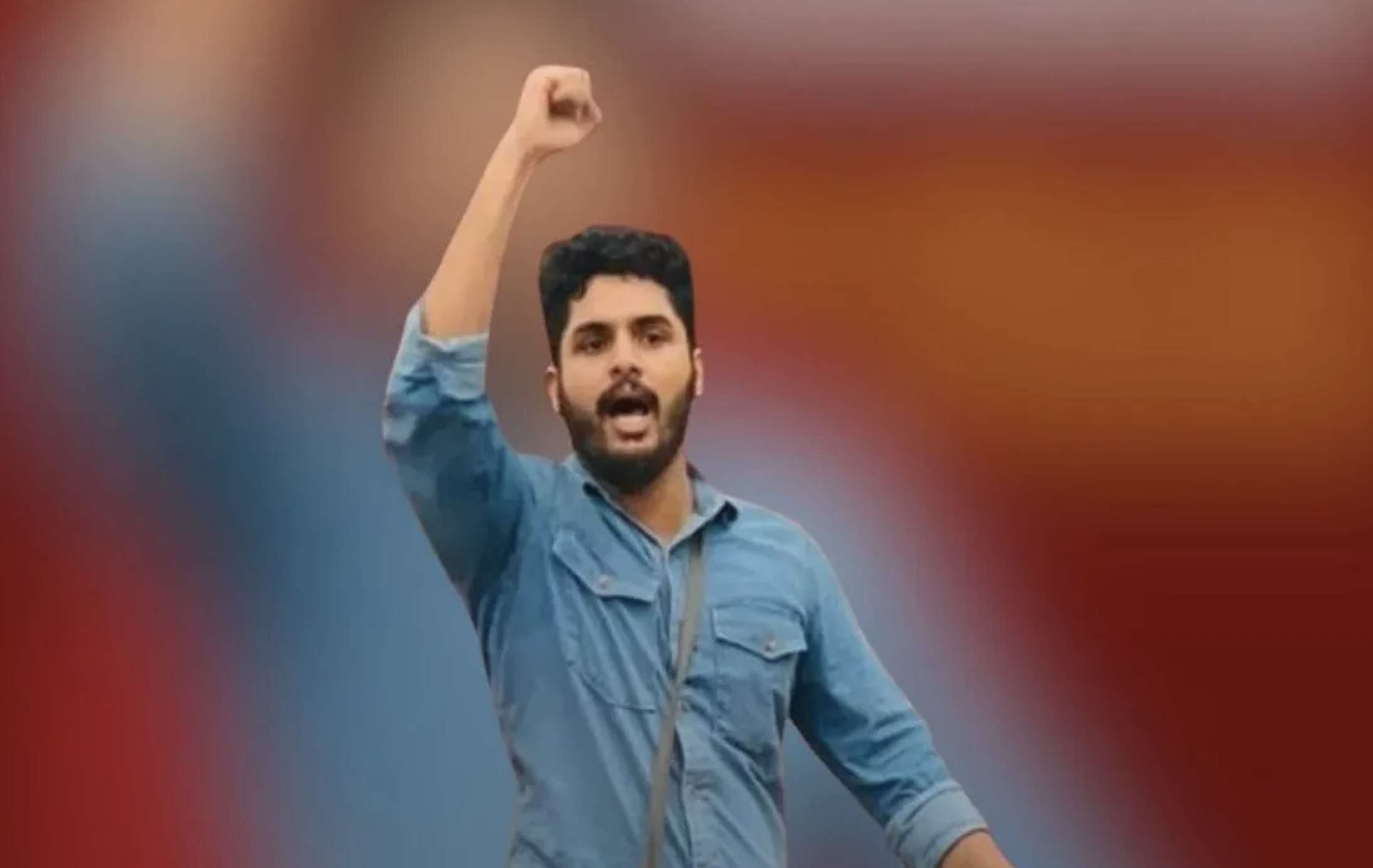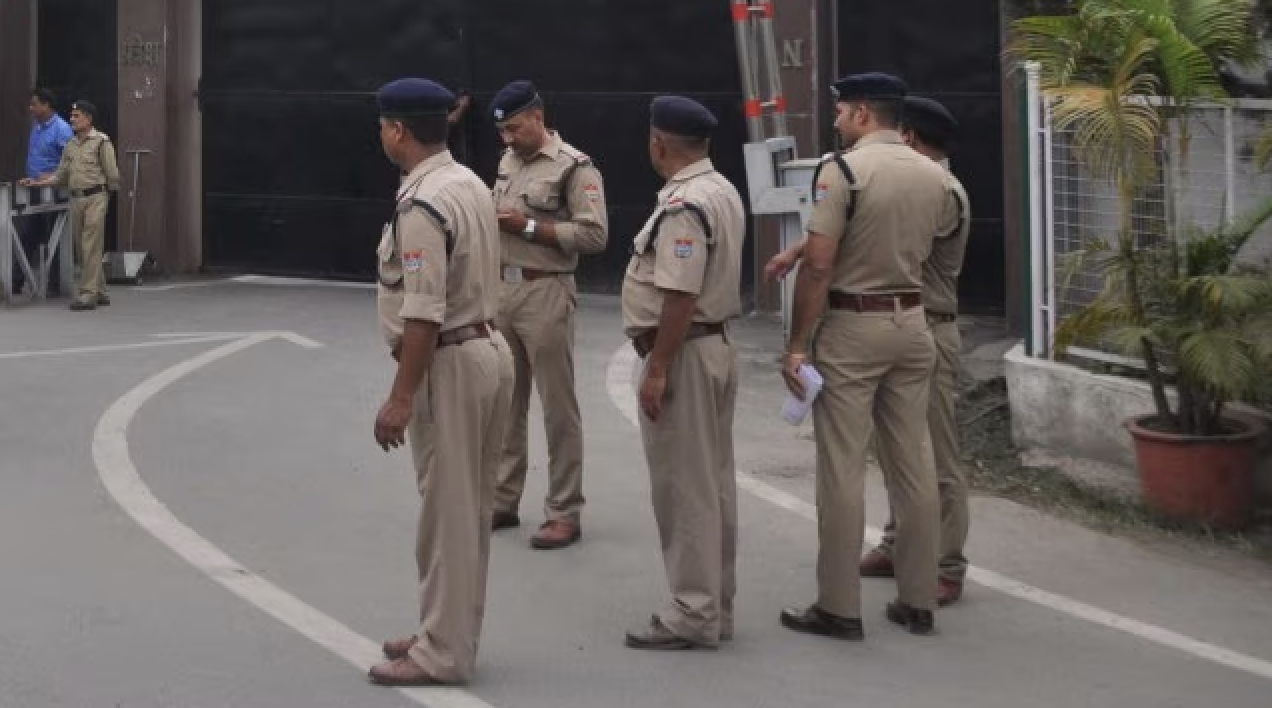
By MAKEPEACE SITLHOU / Article14
Guwahati, Dibrugarh and Tinsukia: In November 2021, Pradip Dutta Roy, a former Congress politician who was suspended from the Bharatiya Janata Party (BJP), was accused in Silchar, South Assam, of sedition, inciting people to rebel or spread disaffection against the State.
This was his crime: A few weeks earlier, Roy had allegedly smeared black ink on an Assamese language government hoarding and demanded that it be removed. On 27 November, hours after the hoarding was removed in the Bengali-language dominated Barak Valley region of the state, Roy was arrested after being questioned by the superintendent of police (SP) of Cachar for over an hour.
The first information report (FIR), the starting point of a criminal investigation, mentioned section 124 A of the Indian Penal Code (IPC), 1860: sedition. The other charges were sections 153 A (promoting disharmony between groups), 295 (defilement of an object held sacred) and 295 A (deliberate and malicious act to outrage religious feelings) of the IPC.
Roy had been arrested for “acts prejudicial to maintenance of harmony”, the special director general of police (DGP) (law and order), GP Singh, tweeted.
At a press conference, Assam chief minister (CM) Himanta Biswa Sarma framed Roy’s action against the hoarding as a “political conspiracy to make the 20 lakh Bengali speaking people living in the Brahmaputra valley vulnerable”.
While Assamese is the official state language, a special provision allows the use of Bengali for administrative purposes in the Cachar, Karimganj and Hailakandi districts that make up the Barak valley. The region saw a mass agitation in 1961, when 11 people died protesting the imposition of Assamese as the official language.
Roy’s arrest did not close the matter. On 5 December, local online daily Barak Bulletin published an editorial titled ‘Welcome to the land of the spineless: We are Assamese’, an editorial in support of Roy.
The website’s editor, Anirban Roy Chowdhury, too, was accused under section 124 A, apart from sections 501 (printing or engraving matter known to be defamatory), 153 A (promoting enmity between groups) and 505 (2) (statements creating or promoting enmity, hatred or ill will between classes) of the IPC.
The complainant in the case against the editor was Silchar-based businessman Santana Sutradhar, reportedly a member of the All Assam Bengali Hindu Association.
The editorial, the complaint said, incited hatred against the Assamese community and “ridiculed our honourable chief minister”, apart from carrying “venom against the Assam Police”, questioning the force’s impartiality in the Pradip Dutta Roy case.
Roy, Chowdhury and several other opponents of the ruling BJP in Assam have in recent years found themselves arrested and charged with carrying out seditious activity, a trend of arrests that emerged in 2017, a year after the BJP formed the government in the state for the first time.
In 2017, Assam recorded a sharp jump in registered sedition cases, from zero the previous year to 19. An Article 14 database that mines multiple media, legal and police sources to record all sedition cases filed between January 2010 and February 2021 shows that the Assam police invoked section 124 A in 27 cases in 2018; 17 in 2019; and 12 in 2020.
The first in a two-part series, this report investigates the misuse of India’s 151-year-old law against sedition, its use to silence political opposition and dissent in Assam, and particularly to harass civil society activists opposing the Citizenship (Amendment) Act, 2019, despite clear Supreme Court rulings (here and here) that say the sedition charge may only be used if there is direct incitement to violence. The second part will examine the pattern in which young Muslim men were booked for sedition for allegedly posting pro-Pakistan slogans, sharing memes or cartoons on social media.
None of the eight cases examined by Article 14 registered in five districts resulted in conviction, but every one of the accused in these cases suffered prolonged detention, legal harassment and, in the case of prominent anti-CAA activists including Akhil Gogoi, violation of prisoner rights. Many cases were eventually dismissed for want of evidence, while some have dragged on for years.
The Article 14 sedition database shows that cases of sedition registered in Assam in 2016, 2013, 2012 and 2011 were related to terrorism charges, against individuals accused of being associated with insurgent groups such as the United Liberation Front of Assam (ULFA) and National Democratic Front of Bodoland. Since 2017, most of the cases were related to the citizenship amendment bill (later the CAA) and purported anti-India slogans on social media. The sole exception was a 2017 case in which two accused were chargesheeted for supporting the ULFA.
Since 2014, according to the Article 14 sedition database, those accused of sedition in India have included opposition politicians, students, journalists, authors and academics.
In July 2021, we reported that the Karnataka police had filed more sedition cases for social media posts than any other state. Most of these cases were illegal. In Uttar Pradesh, our investigation found that more than 1,000 citizens were charged with sedition after chief minister Yogi Adityanath assumed office.
Sedition Charge Against Opponents Of New Citizenship Law
Protests against proposed revisions to India’s citizenship law commenced in Assam as early as 2016, when the Citizenship Amendment Bill (2016) was first introduced in Parliament. Ethnic groups in India’s northeastern states including Assam opposed the prospect of naturalising refugees they considered to be ‘illegal’ migrants from Bangladesh.
Groups in Assam contended that the bill, enacted into a law in 2019, violated the Assam Accord of 1985, a tripartite agreement signed between the union and state governments and the All Assam Students Union (AASU). This agreement ended a six-year agitation to protect local socio-cultural and political interests from an influx of migrants. The accord viewed all those who migrated into Assam after 25 March 1971 as ‘illegal’ foreigners in the state, regardless of religion.
In 2016-17, at the forefront of the protests against the proposed law were student organisations including AASU and the Asom Jatiyotabadi Yuva Satra Parishad (AJYCP). But it was members of peasant rights organisation Krishak Mukti Sangram Samiti (KMSS), led by Akhil Gogoi, who had already been booked twice on sedition charges, who paid the heaviest cost for their dissent against the citizenship bill.
In September 2017, Gogoi, fellow KMSS members Pradip Haloi, Debojit Baruah and Jiten Dutta, the leader of the ‘pro talks’ overground faction of ULFA, were booked on sedition charges. The case was filed after a public meeting in Dibrugarh on 12 September to protest the bill, where Gogoi allegedly said that the time may have come for people to “take up AK47s and the hengdang”, a traditional sword used by the military during the almost 600-year rule of the Ahom dynasty, against the government.
They faced charges under sections 124 A (sedition), 120 B (criminal conspiracy), 121 (waging war against the government), 109 (abetment to a crime), 153 (provocation to cause a riot) and 153 A (promoting enmity between different groups) of the IPC.
Haloi told Article 14 he wasn’t a speaker, nor was he seated on the dais at the Dibrugarh meeting organised by a local women’s group, and that his name was added later to the FIR. The case diary accessed by Article 14 shows that the FIR originally named three accused—Jiten Dutta, Akhil Gogoi and Debojit Baruah—besides other unidentified accused.
Haloi said he had been headed elsewhere that day and the meeting happened to be on the way. “I had only stopped to see what was happening and was standing in the audience,” said Haloi.
He said the KMSS has faced the government’s ire because the organisation has consistently taken up people’s issues. “This is why every government is scared that we will overthrow them, because of the public support we have”
The day after the Dibrugarh meeting, on 13 September 2017, Haloi received news of Gogoi’s arrest, about 30 minutes after the latter was picked up by police. The case was registered in Moran, a town in Dibrugarh district, but Haloi rushed to Dibrugarh police station on receiving a tip-off that Gogoi would be detained there. Eventually, with the police not offering much information, Haloi left.
“I must have covered hardly 2 km before I realised that the police had followed me,” he said. They put Haloi into the police vehicle. “My motorcycle was left on the road exactly where I stopped.”
For a medical examination, Haloi was taken on a lonely road through tea estates and was then lodged at the Barbari police station, a remote outpost in the midst of Ethelwood Tea Estate, apparently so that his colleagues and the media would not find out right away about his arrest.
At Dibrugarh’s Assam Medical College and Hospital, after his medical examination, he made it a point to speak to local journalists. “I had to leave some evidence or trail of my detention,” he told Article 14. “If this arrest had been made today, I would have likely been encountered.”
Haloi was referring to the slew of police encounters that have taken place in Assam since Sarma took charge as CM in May 2021, keeping the home affairs portfolio in the cabinet of ministers. These extra-judicial killings have left 28 dead and 40 injured, including militants and men arrested in cases of rape, murder, dacoity, cattle smuggling and drug peddling.
On 25 September 2017, before Gogoi was presented at the court of the Dibrugarh districts and sessions judge for a hearing of his bail application, the district commissioner of Nagaon submitted a report compiled by the district superintendent of police seeking to charge Gogoi under the National Security Act (NSA), 1980. His lawyer told The Wire that the SP’s report mentioned 12 cases against him, but they had all been registered previously, and had no connection with the present arrest.
Haloi spent six days in custody. He said he was tortured during this time, not allowed to use the washroom, frequently not given food or a place to sleep, complaints he conveyed to the judicial magistrate.
More than a year later, in 2018, a sessions court in Dibrugarh dismissed the case against him for lack of evidence. During this time, his muga and pat silk textile business was dented heavily, with him having to attend at least 20 court hearings.
“Our organisation is not well funded since we work on grassroots issues,” he said. “Thankfully, the Dibrugarh Bar Association gave us all the legal support totally free of cost.”
Meanwhile, Debojit Baruah had managed to secure anticipatory bail.
Gogoi spent 95 days in jail before being released by the Gauhati High Court in December 2017 for non-compliance with the requirements to impose preventive detention.
Among other observations of constitutional guarantees, the court noted that while the NSA enables a government to detain a person with a view to prevent him from being a threat to the security of the state, “if the concerned authorities act in a manner which renders the order of detention to be interfered with because of non-compliance of the requirements as indicated above, such an act on the part of the authorities can also be termed to be a threat to the security of the state.”
Haloi told Article 14 that Dutta’s name, originally one of the main accused, was removed from the chargesheet. He was never arrested, only called to the station as a formality.
The chargesheet listed 54 witnesses apart from seizure of a voice recording and paper clippings from five Assamese newspapers. Some witnesses in the chargesheet explicitly mentioned Dutta’s statements at the meeting, though most directly incriminated Gogoi.
A separate case of sedition was filed against Trailokya Deka and Lakhman Deka in Mangaldoi (in Darrang district in Assam’s North Bank) in October 2017 for hanging a banner that pledged support to ULFA and Jiten Dutta. The case is currently at the evidence stage in the district sessions court.
For Crusader Gogoi, Repeated Charges Of Sedition
Gogoi was booked on sedition charges on two more occasions, in January 2019 and December 2019, for protesting the new citizenship law, as Article 14 reported in December 2020.
On 9 January, an FIR was lodged at the Latasil police station in Guwahati against Gogoi, journalist Manjit Mahanta and noted Assamese writer Hiren Gohain for “demanding secession” at a meeting on 7 January. The complainant in this case was Bhak Ram Kakti, reportedly a member of the RSS. In his complaint, Kakti also mentioned that former chief ministers Praffula Kumar Mahanta (Asom Gana Parishad) and Tarun Gogoi (Indian National Congress) delivered a speech against prime minister Narendra Modi and then chief minister Sarbananda Sonowal at this meeting.
Gogoi was accused of delivering “speech against independence of Assam” and asking people to stand for a “separate Assam from India and to make it independent” (sic).
According to the complainant, Gohain supported Gogoi’s call.
Speaking to Article 14, Gohain, almost 80 years old then, said Gogoi had not made the call for secession. An unknown young man had taken the mic and said the time had come for Assam to secede.
“Gogoi stood up and agreed that he felt the same, because that was the general mood at the time. People were so outraged,” said Gohain, an Assamese literary critic and regular contributor to the Economic & Political Weekly.
Contrary to the complaint, Gohain said he did not support the calls for secession that were an “emotional outburst”, not a concrete call to action. “I said let us exhaust all constitutional means and only if they fail, then this question will come,” he said.
The local press, however, painted a different picture the following morning, suggesting that Gohain had called for an armed struggle. “It was pure bunkum so I didn’t take it seriously,” he said.
The journalist Mahanta, who contested the 2021 assembly election from Guwahati as a Congress candidate, said the charges against him were dropped after video clips produced by the government counsel were found to have been edited.
Gohain’s lawyer Arup Barbora told Article 14 that after interim pre-arrest bail was secured from the Gauhati high court, the police failed to submit a chargesheet. Two years have now elapsed since the FIR was filed.
According to Mahanta, Assam’s advocate general Borpatra Gohain told the court that they would produce more evidence against Gohain and Gogoi. “It was a conspiracy of the RSS and the BJP to send a message to the public that if we fight against them, this is the kind of mental harassment we can expect,” he told Article 14.
A respected public intellectual in Assam, Gohain has been a lifelong critic of the Congress government’s handling of the Assam agitation and military operations to flush out ULFA cadres. He had also criticised Assamese ‘chauvinism’ at the height of the six-year student-led agitation that culminated in the Assam Accord of 1985.
More recently, three leading Assamese dailies, one of which is part of the state’s oldest media house, the Assam Tribune group, allegedly refused to publish a column by Gohain. In his piece, Gohain mentioned an investigative report by The Wire and The Cross Current, a local weekly, on allegations of a government land grab linked to the chief minister’s family.
“There’s no freedom of expression left now,” he told Article 14. “It’s going to get very difficult for anyone to speak their mind.”
Anti-CAA Movement A ‘Maoist’ Conspiracy: NIA
By the end of 2019, as the state police and paramilitary forces cracked down on citizens protesting the CAA across Assam, five protestors were dead in Guwahati.
Thousands of protestors in the city and upper Assam, hotbeds of the anti-CAA movement including Chabua, Tinsukia and Dibrugarh towns, were detained. At least 82 people were arrested on charges of arson, vandalism, destruction of public property and rioting.
Activists of Gogoi’s KMSS were singled out for charges of sedition and the Unlawful Activities (Prevention) Act (UAPA), 1967, as Article 14 reported in December 2020.
The state’s Director General of Police, Bhaskar Jyoti Mahanta, however, said the following February that the affiliations of the arrested were “incidental”.
Dhirjya Konwar, Manas Konwar and Bittu Sonowal, all KMSS members, were booked with Gogoi under sections 18 (conspiracy) and 39 (support to a terrorist group) of the UAPA, along with 124 A (sedition) and other sections of the IPC pertaining to criminal conspiracy, promoting enmity between groups, imputations prejudicial to national integration. The cases against them were lodged at nine police stations across Assam.
On 14 December 2019, the National Investigation Agency (NIA) re-registered a case arising out of the FIR lodged at the Chanmari police station in Guwahati, claiming that the KMSS had links with Naxal groups, and was using the anti-CAA protests to further violence. “… investigate Krishan Mukti Sangram Samiti (KMSS) – CPI (Maoist) links and conspiracy to create enmity between different groups,” the NIA’s FIR said.
It took more than a year, but the four were discharged by the special NIA court on 1 July 2021—the court found no material in the cited evidence to frame charges against them.
Speaking to Article 14 three months later, Dhirjya and Bittu said they were shocked that the NIA stepped into a local matter. The other cases against them, at the Basistha police station in Kamrup Metropolitan district, were for blocking roads, allegedly attacking traffic staff and damaging government property.
Manas Konwar and Gogoi were booked at the Pulibar, Teok, Sivsagar, Gaurisagar and Chabua police stations for unlawful assembly, criminal conspiracy, blocking roads and damaging public property.
“Why would the NIA arrest Akhil Gogoi just because an officer-in-charge in Chabua had his teeth broken?” asked Dhirjya. Outside Guwahati, Chabua was the epicentre of the CAA protests where the post office, railway station, circle office and an MLA’s residence were set on fire.
Bittu and Dhirjya, who spent seven months in Guwahati central jail, felt targeted because of their close association with Gogoi. “There were thousands of protestors out on the streets at that time,” Bittu said. “How did they narrow down on just the four of us?”
The NIA chargesheet, accessed by Article 14, said a key ‘fact’ that emerged in the investigation was that Gogoi had “several secret meetings with members of CPI (Maoist) and had sent around 15 cadres/members of the KMSS in batches of 05 each to train in camps of CPI (Maoist)”. The chargesheet listed 76 witnesses and 90 documents, including Marxist and Leninist literature seized from his residence.
During the 10 days Bittu and Dhirjya spent in judicial custody, neither was interrogated about KMSS’s alleged links with Maoists, they said. “Even they knew this was a politically motivated case,” said Bittu.
Officers reportedly went through his call records and, of more than 100 contacts, quizzed him about a Muslim friend. Questioning the independence of the NIA, Bittu said, “It appeared that the officers were trained by the RSS.”
In its discharge order, the special NIA court found the conduct of the investigating authority and prosecution in the case to be “discouraging, to say the least”.
On the use of the sedition charge, the NIA court referred to Tara Singh Gopi Chand Vs. The State (1950), in which then chief justice Eric Weston had said, “India is now a sovereign democratic state. Governments may go and be caused to go without the foundations of the State being impaired. A law of sedition thought necessary during a period of foreign rule has become inappropriate by the very nature of change that has come about.”
Divide And Rule: Why Some Were Not Booked For Sedition
Civil society organisations, ethnic groups, engineers, doctors, advocates, journalists, artistes and residents from nearby villages in Chabua, in Upper Assam, had planned a demonstration against the CAA in Jorhat, to be held on 16 December 2019. This was close on the heels of Gogoi’s arrest from Jorhat on 12 December.
Among those who participated was Utpal Baruah, a young businessman in Chabua who had joined protests led by Gogoi on the days preceding his arrest. In March 2020, Baruah told Article 14 that he was merely a witness to the arson that had occurred after the massive protest at the Chabua railway station.
“Thousands of people had gathered, but the police picked up 20-25 people through the month of December, 15 of them from interior villages in Chabua,” he said. According to court records, 17 people were booked in a single case under sections 307 (attempt to murder), 446 (house break-in) and 147 (rioting) of the IPC. Sedition charges were not applied in this case.
Baruah was released on bail from Dibrugarh central jail two months later, on 4 March.
“As the breadwinner for my family, my wife and kids as well as my parents suffered a great deal while I was away,” he said. His family spent Rs 70,000 in legal costs.
The KMSS had covered the bail costs of only the organisation’s members, leaving Baruah demoralised.
Bijoy Bordoloi, an AASU leader in Jorhat, said it wasn’t KMSS members but common people from various nearby villages who attended Gogoi’s rally from December 10. Asked how none of the AASU men or common residents had been booked on sedition charges, the leader said the government was using a British-era ploy of ‘divide and rule’.
“While a majority of those picked up were members from KMSS, AJYCP and other small outfits, not one AASU member was arrested,” said Anuj Chhetri, president of the Dibrugarh Bar Association.
Journalist-turned-politician Mahanta, who lived through the turbulent insurgency of the nineties when public support for ULFA was at its peak, said that police tactics have hardly changed since. “They’ll always target a local leader who mobilises the nearby villagers. By doing this, his associates are successfully intimidated,” he said.
Sedition Against Critics Of State’s Handling Of Covid-19
In the first week of April 2020, a returnee from the Tablighi Jamaat markaz in Delhi’s Nizamuddin area became the first Covid-19 case detected in Assam. The markaz had been deemed a ‘super spreader’ by national media after 1,000 attendees tested positive for the virus.
Using cell tower triangulation to trace attendees, a list titled ‘Assam persons present in the area‘ was released on 31 March, with 299 names of Assam residents who had been in or around Nizamuddin in mid-March.
As many as 70 Jamaat attendees from Assam were tracked down and, with immediate family members, placed in mandatory institutional quarantine at the Sarusajai stadium in Guwahati, for weeks.
On 6 May, Congress legislator Abul Kalam Rasheed Alam held a press conference where he criticised the state government’s handling of the Covid-19 situation. That evening, the Marnoi police in Goalpara booked him in a case of sedition.
He had raised the issue of daily wage labourers in his constituency going hungry since the imposition of the lockdown. Alam exhorted the then chief minister, Sarbananda Sonowal, to extend relief and food supplies to the labourers.
Alam had been in isolation at his home in Goalpara, western Assam, since returning from the markaz on 4 April, and had completed two additional weeks of isolation beyond the required period.
According to the FIR against him, Alam had tried to instigate people “to disrespect the government guidelines related to lockdown and COVID-19 and abet waging of war against the government of India”.
Alam believed it was the then upcoming 2021 assembly election that had prompted his arrest. “This is totally political. They want to finish the opposition,” he said. On 13 May, another case was filed against him under the Disaster Management Act, 2005, for travelling from Goalpara to Guwahati with his wife after she developed complications in her pregnancy.
Earlier, on 7 April, another opposition legislator, Aminul Islam of the All India United Democratic Front (AIUDF), was also booked under sedition for making “communal and false comments” in an audio clip that had gone viral. In the clip, Islam said a particular community was being targeted on the pretext of the pandemic, and that there could be a conspiracy to kill those being quarantined.
Alam said he didn’t concur with the AIUDF legislator’s views, but added that the issue of negligence at the quarantine centre was a legitimate one.
“In the Goalpara quarantine centre, people were not fed for three days. They didn’t provide any drinking water, and instead asked people to drink from the toilets,” he said. “Even the nurses on duty were not given food.”
Two Supreme Court decisions, Kedar Nath Singh Vs. State of Bihar (1962) and Balwant Singh & Bhupinder Singh Vs. State of Punjab (1962), clarify that the sedition law may only be applied when there is clear incitement to violence, or intention to create disorder. In the cases of Alam and Islam, such an incitement was plainly absent.
On 18 May, the Gauhati high court granted pre-arrest bail to Alam. The bail order said expressly that a “grievance has been raised against the government” and that may be “fair criticism”.
The order said grievances had arisen during the pandemic among all sections of people against the government. “… all such voices cannot be condemned as sedition against the government.”
This article first appeared on article-14.com






